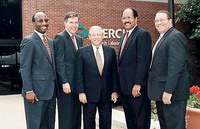Merck & Co to promote new cholesterol and obesity drugs
Merck & Co. will try to get an approval for new cholesterol and obesity drugs next year.

During their annual briefing with analysts, Merck executives said strong sales from several new products, and also existing drugs such as allergy and asthma treatment Singulair, should offset declining revenue from its top-selling drug, Fosamax. The osteoporosis treatment, which loses its patent protection early next year, is expected to have 2007 sales of about $2.3 billion (1.57 billion EUR).
The meeting comes five weeks after Merck reached an agreement with plaintiffs lawyers to settle up to 50,000 Vioxx lawsuits for $4.85 billion (3.31 billion EUR). The painkiller was pulled from the market after Merck researchers determined the drug doubled the risk of heart attacks and strokes.
Merck Chief Executive Richard Clark said the company is "firmly on track" on its long-term financial goals and is building on successful launches of seven new products in the past two years. Those include diabetes drugs, a new type of HIV drug called Isentress, and vaccines such as Gardasil to prevent cervical cancer and Zostavax to prevent shingles.
"I am obviously pleased with the success we've achieved in increasing revenue," he told the analysts.
Peter Kim, head of Merck Research Laboratories, said Merck will seek approval in 2007 for taranabant, an obesity treatment that helped people lose up to 9 pounds over 12 weeks but showed some psychiatric side effects. The drug is similar to one rejected by the Food and Drug Administration in June because of suicidal thoughts in depressed patients; it is sold elsewhere by Sanofi-Aventis SA as Accomplia. Merck is now testing taranabant at low doses.
A second drug in development faces a similar situation - anacetrapib, a drug aimed at both raising levels of good cholesterol and lowering bad cholesterol. Rival Pfizer Inc. halted development of a drug in the same class, called CETP inhibitors, because it raised blood pressure significantly; Kim said Merck's drug doesn't do that.
FDA approval for expanded uses of two existing products is also being sought, Kim said. One is for the cervical cancer vaccine Gardasil, to specify use in women 27 to 45; it's on sale for females aged 9 through 26. The other is for its HIV treatment Isentress, to expand use from patients who have failed other therapies to ones who haven't taken other AIDS drugs yet.
Kim also detailed research on other experimental drugs in late development, including a hepatitis B vaccine and drugs for migraines, osteoporosis, heart failure and for endometrial and other cancers.
Merck is on track to meet its goal of 4 percent to 6 percent compound annual revenue growth from 2005 to 2010, Clark said.
The company has boosted revenue 8 percent year to date, said Merck's marketing chief, Executive Vice President Kenneth Frazier.
He said the company is changing how it does business, from speeding the launch time once products are approved to better internal collaboration.
"We've begun to prepare for our next wave of product launches," Frazier added.
Approval is expected next year for Cordapative, for hardening of the arteries, and for an intravenous version of Emend, for nausea and vomiting in chemotherapy patients.
Chief Financial Officer Peter N. Kellogg noted manufacturing has been revamped to save money as well.
Despite the loss of patent protection for blockbuster cholesterol drug Zocor last year, and the looming Fosamax patent protection, Kellogg said Merck still expects strong profit this year and next. He reaffirmed forecasts for earnings per share of $3.08 (2.10 EUR) to $3.14 (2.14 EUR) this year and $3.28 (2.24 EUR) to $3.38 (2.30 EUR) in 2008, both excluding one-time items.
The company has also nearly reached its target of cutting 7,000 positions by the end of 2008. The job cuts are part of a cost-cutting plan announced by the company in 2005.
Merck share rose 5 cents to $60.82 in midday trading.
Subscribe to Pravda.Ru Telegram channel, Facebook, RSS!


